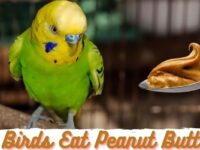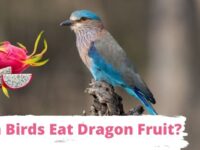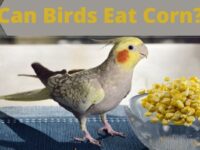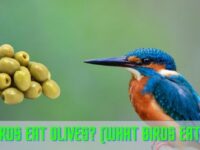A bird’s diet consists of various foods, such as insects, seeds, fruits, vegetables, and other foods. You might be thinking about feeding cherries to birds, just as other individuals want to know whether birds can eat cherries or not.
Birds can eat cherries due to their taste, and nutrients in the cherries are beneficial for the bid’s health, but it is necessary to remove the seeds or pits from the cherries before providing them to birds.
Are Cherries Safe For Birds?
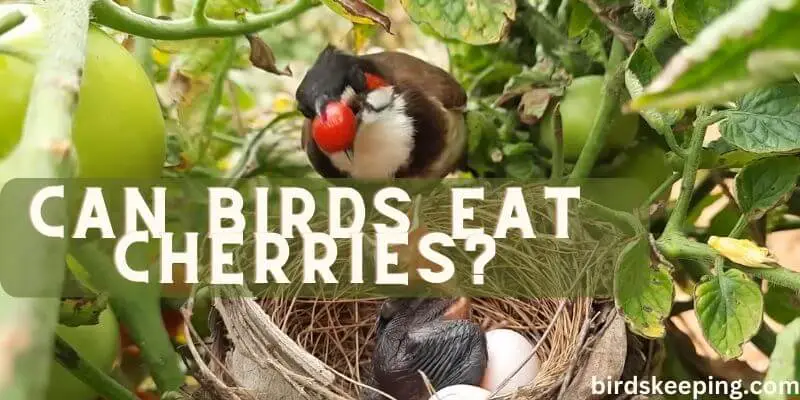
Cherries are small fruits that look like small stones and come in various colors. They are highly nutritious and healthy for birds, and the presence of Carbs, Vitamin C, and Fibers make them one of the healthier foods for eating. But the question that arises here is, are cherries safe for birds?
Safety means they are not harmful to the birds. The answer to this question is that cherries are entirely safe for birds.
But this is not the direct answer, and you should be cautious whenever you feed cherries to birds because you can not directly give cherries to them for eating.
However, cherries are very beneficial for health, and the antioxidant property present in the cherries is one of the main benefits from which birds benefit.
But whenever you serve cherries to the birds, make sure to remove the harmful substances from the cherries before giving them to birds.
Do Birds Like Cherries
Birds love to eat different types of fresh fruits and other foods in the wild, just like birds can eat other fruits. Cherries are also widely available in the wild, and you can offer cherries to birds for eating.
Birds like to have cherries in their diet, and they will enjoy eating cherries. Birds can easily eat them, and they will benefit from these cherries.
But ensure to provide different foods and fruits to birds and do not provide them only cherries regularly.
How To Feed Cherries To Birds
When you make your decision to feed cherries to birds, the first thing you have to do is find organic cherries in your local market. Organic cherries are more healthy for birds than other ones.
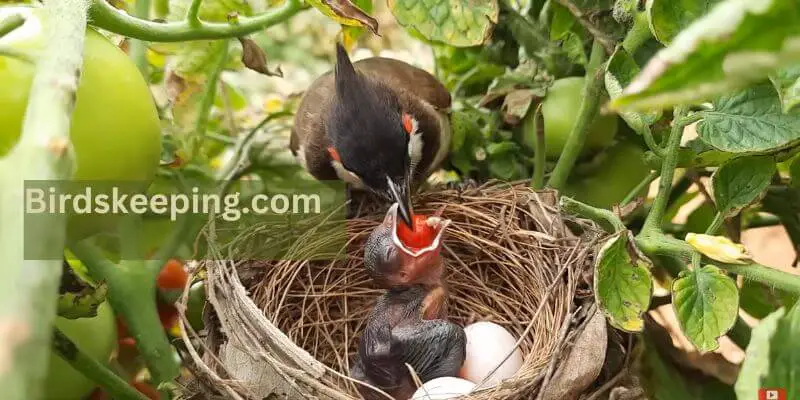
If you are unable to find organic, then you can go with the cherries available in your local market. The next thing you should do is wash those cherries and dry them with clothes or wait for a few minutes.
You should never provide a whole cherry to birds and make sure to cut them into little pieces. The major concern is to remove the pits from cherries, and the presence of cyanide is usually found in pits.
This could be deadliest for your birds if you forgot to remove pits before providing the cherries.
The interesting thing is you can feed cherries to birds with your hands directly. Also, you can place those small pieces of cherries in a bowl and offer them.
What Birds Will Eat Cherries?
Not all birds would like to eat cherries, but several birds will enjoy eating cherries. Wild birds are very experienced when it comes to eating cherries.
So whenever you offer cherries to birds, the wild birds will be attracted faster than garden birds. Below are some popular birds who will enjoy eating cherries.
- Bluebirds
- Catbirds
- Finches
- Mockingbirds
- Parrots
- Waxwings
- Blue jays
- Woodpeckers
- Cardinals
From the above list of birds, bluebirds, finches, catbirds, mockingbirds, and waxwings will enjoy eating cherries. Also, other birds listed above can occasionally eat them easily.
Can Wild Birds Eat Cherry Pits?
Cherries have small and hard pits covering the seed of cherries. The presence of cyanide compounds makes the pits of cherries a very poisonous fruit.
Cherry pits are not even recommended for humans, and humans can not consume more than 2 to 3 cherry pits at once.
If humans consume more than 2 to 3 cherry pits, this may lead to a severe health condition. Now comes the question: can wild birds eat cherry pits?
Wild birds can not eat cherry pits because the presence of cyanide in the pits can kill the birds.
However, when you offer cherries without removing pits, then birds will not avoid eating those cherry pits.
After getting fed with cherry pits, birds will experience a cardiac issue within 3 to 4 hours, and birds will also experience diarrhea and vomiting.
Hence, it is not recommended to offer cherries with pits to birds. That’s why it is advised to remove pits from cherries before offering them to birds.
Can Birds Eat Dried Cherries?
Their moisture is removed to keep them unrotten for longer without losing their flavors and nutrients. These dried cherries also have the same nutrients present in them, and the only thing is the absence of moisture.
Birds can eat dried cherries and enjoy eating the same way they enjoy cherries. But it would be best to keep an eye while feeding them to birds to avoid any overfeeding problems. They are a good alternative when there is no season for cherries.
Can Conures Eat Cherries?
Conures enjoy eating oranges, apples, and other fruits. Conures also love to eat cherries, and you might have thought about cherries. Cherries are a good source of nutrition for birds, and conures can eat cherries without any hesitation.
But if you are planning to feed cherries to conures, then you should remove the pits from cherries before offering them to conures.
If you are planning to feed dried cherries to conures, then it is also a good decision if there is no season of cherries in the market.
Last Thought
Feeding birds cherries is not a bad idea, and you can serve them by using various methods. Also, one of the perfect ways to feed them cherries is discussed above.
Birds can eat cherries as they contain several nutrients which are beneficial for birds’ health. But do not forget to remove the seeds or pits from the cherries before serving them to birds.
Related Posts
Birdskeeping is supported by its readers. When you purchase through links on our site, we may earn an affiliate commission. Also, as an Amazon affiliate, we earn from qualifying purchases without costing you extra.

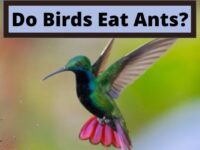
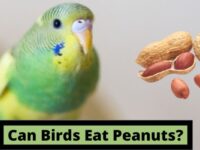
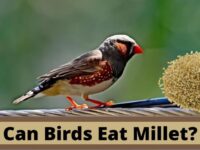
![Can Birds Eat Beans? [Safe or Toxic?]](https://birdskeeping.com/wp-content/uploads/2022/06/Can-Birds-Eat-Beans-200x150.jpg)

